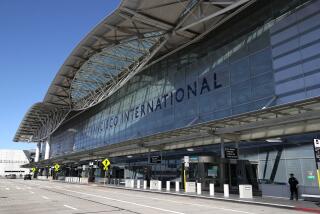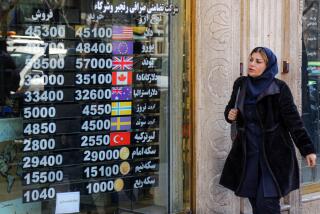Iran’s airline passengers are mad and aren’t taking it anymore
- Share via
Reporting from Tehran — Enraged at unremitting flight delays, frustrated Iranian airline passengers have adopted a novel form of protest: spontaneous sit-ins staged inside idle aircraft.
Iranian news media have cited several recent incidents in which passengers enduring prolonged delays have refused to leave aircraft once their planes belatedly arrived at their destinations, sometimes as much as 22 hours late.
In some cases, the on-board sit-ins have lasted for several hours, according to media reports here.
Scuffles and volleys of insults have also broken out between enraged passengers and flight crews, the Iranian press says.
Many Iranians have now come to accept two or three-hour delays as the norm on domestic routes. But sometimes the wait is much longer—and many flights are postponed, though officials could provide no precise figures.
On Feb. 22, passengers of ATA airlines endured a 12-hour wait on a scheduled flight from Mashad in eastern Iran to Tehran, the capital—a run that should take less than two hours. Passengers were told “technical problems” and inclement weather were the reason, according to Tabnak.ir, an Iranian news website.
Upon arrival in Tehran, the website said, furious passengers refused to leave the plane. It was not clear how long they remained on the aircraft.
In another recent reported incident, Shiite Muslim religious pilgrims returning from Baghdad on Iran Air endured a 13-hour delay—and then faced a similar marathon holdup in making a connection to Mashad. Their ad hoc protest resulted in the passengers being given refunds for the Tehran-Mashad leg of the journey.
One passenger recalled how a recent flight from Tehran to the northwestern city of Tabriz was delayed three hours for a “technical check,” as fed-up travelers grew more and more impatient.
“People got very angry and exchanged insults with local officers and even started criticizing top officials for mismanagement,” said Farzane, 53, a passenger who asked that her family name not be used for privacy reasons. “Finally, with great hesitation we boarded and prayed for God to care for us. When we landed, we all breathed a deep breath of relief.”
Pressed to explain the delays, Iranian aviation authorities have stressed their focus on safety and blamed a familiar culprit: U.S.-led international sanctions that have battered Iran’s economy. The trading bans have made it difficult for Iranian airlines to purchase new aircraft or procure replacement parts for aging Boeing and Airbus fleets.
“Because of sanctions, Iran cannot buy new planes and it can be hard to find spare parts,” Ali Sorani, an aviation engineer trainee, said in an interview. “No matter how long the delay, we are told we have to make sure that the flights are safe.”
But many passengers don’t buy the official justification.
And neither, apparently, does Iran’s leadership, which is generally wary of protests that may reflect badly on the ruling clerical and security hierarchy. The aviation delays appear to have touched a nerve, however.
In last week’s Friday prayers in Tehran, Hassan Rahimpour Azghadi, a leading pro-government ideologue, praised the impromptu protests and condemned the epidemic of flight tardiness.
“We are disrespecting the rights of passengers,” declared Azghadi, a member of Iran’s Supreme Council for the Cultural Revolution, a powerful oversight body. “We are wasting their time and disregarding their dignity.”
Nor did Azghadi accept the explanation that sanctions are to blame for the delays. Iranian officials are generally hesitant to credit sanctions publicly with having any negative effects, dismissing the measures as irrelevant and a product of entrenched Western hostility.
“I asked one of the officials of the aviation agency, and he told me that delays have nothing to do with sanctions,” Azghadi assured his Friday prayer listeners. “The delays are a consequence of inefficiency and mismanagement.”
Special correspondent Mostaghim reported from Tehran and staff writer McDonnell from Beirut.
Follow @mdcneville for news from the Middle East
More to Read
Sign up for Essential California
The most important California stories and recommendations in your inbox every morning.
You may occasionally receive promotional content from the Los Angeles Times.










